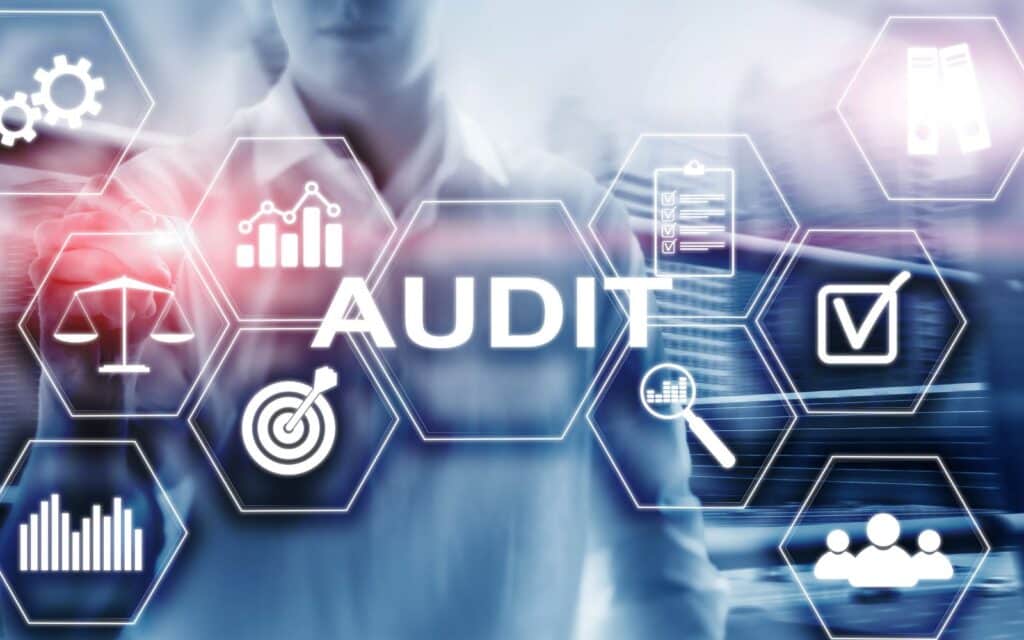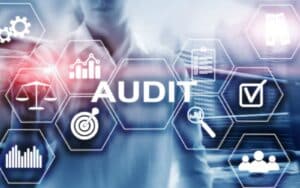Corporate Tax Audit: What to Do Now

Facing the troubles of a potential corporate tax audit with the CRA. Don’t worry, read this to understand your next steps.
Table of Contents
The moment you open that official corporate tax audit notice from the Canada Revenue Agency (CRA), your heart sinks.
The words “Notice of Audit” seem to jump off the page, and suddenly you’re asking yourself: “Corporate tax audit: what to do now?” Take a deep breath – you’re not alone, and this situation is more manageable than it initially appears.
If you’re reading this, you’ve likely just received a corporate tax audit notice and are feeling overwhelmed by what comes next.
First, understand that tax audits are a routine part of the CRA’s compliance activities, designed to ensure businesses are meeting their tax obligations. An audit notice doesn’t automatically mean you’ve done something wrong – it’s simply the CRA’s way of verifying that your tax filings are accurate and complete.
The key to successfully navigating a corporate tax audit lies in taking immediate, informed action. Panic and hasty decisions can complicate what should be a straightforward process.
In this comprehensive guide, you’ll learn the critical first steps to take, how to assemble the right professional team, what documents you’ll need to prepare, and how to communicate effectively throughout the audit process.
Your Immediate "Do Not Disturb" Action Plan (The First 48 Hours)
Don't Panic (Seriously)
While receiving an audit notice is undoubtedly stressful, maintaining clarity is crucial for making sound decisions. Corporate tax audit preparation begins with a calm, methodical approach. Your emotional state in these first hours can significantly impact how well you handle the entire process.
Do NOT Contact the CRA Immediately
This might seem counterintuitive, but resist the urge to call the auditor right away. Any initial communication without proper preparation could lead to misunderstandings or statements that might be taken out of context. Instead, use this time to gather information and prepare your approach.
Locate and Review the Audit Letter Thoroughly
Your audit notice contains critical information that will guide your entire response strategy. Carefully examine:
- Scope of the audit: Which tax years are being reviewed?
- Areas of focus: Is this a GST/HST audit, corporate income tax review, or payroll examination?
- Auditor contact information: Note the assigned auditor’s name and contact details
- Deadlines: Mark all important dates in your calendar
- Initial document requests: What records are they asking for initially?
Understanding the CRA audit process from the outset will help you respond appropriately.
Notify Key Internal Stakeholders
Immediately inform essential team members, including your CEO, CFO, and internal accounting staff. However, limit this circle to only those who need to know. Too many people involved in the communication process can lead to confusion and inconsistent messaging.
Designate a Single Point of Contact
This is perhaps one of the most critical decisions you’ll make during the audit process. All communication with the CRA should flow through one designated person – ideally your tax professional. This prevents mixed messages and ensures consistency in your responses.
Start a Dedicated Audit File
From day one, maintain meticulous records of all audit-related activities. This file should include:
- The original audit notice
- All correspondence with the CRA
- Internal notes and meeting minutes
- Document requests and responses
- Professional advice received
Assemble Your A-Team: Why Professional Help is Non-Negotiable
The Critical Role of a Tax Accountant or Specialist
When facing a CRA audit small business owners often wonder if they can handle the process alone. While legally possible, professional representation offers significant advantages:
Expert Knowledge: Tax professionals understand the nuances of Canadian tax law and CRA procedures. They can identify potential issues before they become problems and ensure your responses are both accurate and strategically sound.
Communication Buffer: Having a professional act as your primary contact with the auditor allows you to focus on running your business while ensuring all communications are handled appropriately.
Strategic Response: Tax specialists know how to present information in the most favorable light while maintaining complete honesty and transparency.
When to Consider Tax Lawyer Involvement
For most routine audits, a qualified tax accountant or specialist is sufficient. However, consider engaging a tax lawyer if:
- There are concerns about potential fraud or misrepresentation allegations
- Significant penalties are at stake
- The audit scope expands beyond the original notice
- Criminal charges are a possibility
Benefits of Professional Representation
Professional tax audit help provides several key advantages:
- Stress Reduction: Knowing experts are handling the technical aspects allows you to focus on business operations
- Accuracy Assurance: Professionals ensure all responses are complete and compliant
- Risk Mitigation: Expert guidance minimizes the chance of errors that could complicate the audit
- Scope Management: Professionals help keep the audit focused on its original parameters, preventing unnecessary expansion
Document Deep Dive: What the Auditor Will Want
Commonly Requested Documents
Corporate tax compliance requires maintaining comprehensive records. During an audit, expect requests for:
Financial Records:
- General ledger and all subsidiary ledgers
- Bank statements and reconciliations for all business accounts
- Trial balances and financial statements
Transaction Documentation:
- Sales invoices and supporting documentation
- Purchase invoices and expense receipts
- Contracts, agreements, and loan documents
- Asset registers and depreciation schedules
Tax-Specific Documents:
- Corporate income tax returns (T2s) and supporting schedules
- GST/HST returns and backup documentation
- Payroll records including T4s, T4 summaries, and source deduction remittances
Corporate Governance:
- Minutes of board meetings and shareholder resolutions
- Corporate bylaws and articles of incorporation
The CRA’s business records requirements provide detailed guidance on what documents businesses must maintain.
Best Practices for Document Preparation
Accuracy is Paramount: Ensure all records are complete, accurate, and properly supported. Any discrepancies will likely trigger additional scrutiny.
Organization Matters: Present documents in a logical, easy-to-follow format. Create an index or table of contents for large document packages.
Digital Preparation: Most auditors prefer digital documents, but be prepared to provide physical copies if requested. Ensure all electronic files are properly labeled and accessible.
Provide Only What’s Requested: Resist the temptation to volunteer additional information beyond the audit scope. This could inadvertently expand the audit into areas not originally under review.
Maintain Complete Copies: Keep detailed records of everything provided to the auditor, including the date and method of transmission.
Navigating the Audit Process: Communication and Conduct
Key Communication Principles
Professional Cooperation: Maintain a respectful, professional demeanor throughout the process. Being cooperative doesn’t mean being submissive – you can be firm when necessary while remaining courteous.
Channel All Communication: Reinforce that all substantive communication should go through your designated tax professional. This ensures consistency and prevents misunderstandings.
Be Direct and Accurate: When asked direct questions, provide honest, factual answers. However, avoid speculation or volunteering information beyond what’s specifically requested.
Understanding the Auditor's Perspective
CRA auditors are professionals doing their job – verifying tax compliance. They’re not adversaries looking to destroy your business. Understanding their role can help you work more effectively with them throughout the process.
Meeting Logistics and Preparation
Audit meetings may occur at your business premises, the CRA office, or virtually. Regardless of location:
- Ensure a dedicated, private space for discussions
- Have all requested documents organized and readily available
- Take detailed notes of all conversations and requests
- Bring your tax professional to all meetings
The CRA audit process guide outlines what to expect during the actual audit procedures.
Potential Outcomes & What Comes Next
Possible Audit Results
No Changes Required: The best-case scenario where your records are found to be accurate and compliant. This validates your bookkeeping practices and provides peace of mind.
Proposed Adjustments: The auditor may recommend changes to your filed returns, potentially resulting in additional taxes, penalties, or interest charges. Don’t automatically accept these proposals – they can often be negotiated or challenged.
Notice of Reassessment: This formal document outlines any changes to your tax position. You have specific timeframes to respond if you disagree with the assessment.
Your Options After the Audit
Review and Analysis: Work with your tax professional to thoroughly understand any proposed changes and their implications.
Agreement or Dispute: You have the right to challenge findings you believe are incorrect. The objection and appeal process provides formal mechanisms for disputing assessments.
Implementation of Recommendations: Even if you agree with the auditor’s findings, use this as an opportunity to strengthen your internal processes and prevent future issues.
Learning from the Experience
Every audit, regardless of outcome, provides valuable insights into your tax compliance processes. Consider:
- Strengthening internal controls
- Improving documentation practices
- Implementing regular internal reviews
- Updating accounting procedures
Dealing with a Corporate Tax Audit: Your Path Forward
A corporate tax audit doesn’t have to be a business-threatening event. With proper preparation, professional guidance, and a systematic approach, you can navigate the process successfully while minimizing disruption to your operations.
Remember that tax audit defense is often about preparation and professional representation rather than confrontation. The vast majority of audits are resolved amicably when businesses cooperate fully and provide accurate information.
Key Takeaways for Corporate Tax Audit Success
- Stay Calm: Panic leads to poor decisions
- Get Professional Help: Tax specialists are worth the investment
- Be Organized: Proper documentation is your best defense
- Communicate Strategically: Channel all communication through your representative
- Learn and Improve: Use the experience to strengthen your compliance processes
What to Do If Your Corporation Is Audited: Your Next Steps
If you’re currently facing a corporate tax audit, don’t delay in seeking professional assistance. The sooner you engage qualified help, the better positioned you’ll be for a successful outcome.
For immediate guidance and support throughout your audit process, consider consulting with experienced tax professionals who specialize in CRA compliance and audit defense. Their expertise can make the difference between a stressful, prolonged audit and a smooth, efficient resolution that protects your business interests.
Remember, thousands of Canadian businesses successfully navigate tax audits every year. With the right approach and professional support, you can join their ranks and emerge from the process stronger and more compliant than before.
Contact Sansar Solutions to help you naviagte your corporate tax audit in peace with the CRA.
Get The Support You Need With Your Corporate Tax Audit
Sansar Solutions is your reliable choice for a corporate tax accountant who can help you navigate the complexitiies of a corporate tax audit.
Frequently Asked Questions When About Corporate Tax Audit
A corporate tax audit is when the Canada Revenue Agency (CRA) reviews your business’s financial records to ensure your tax filings are accurate and compliant with Canadian tax laws.
Auditors may examine financial statements, invoices, receipts, bank records, payroll data, GST/HST filings, and any other documentation related to your business’s income and expenses.
The CRA will notify you by mail or phone and send an official audit letter outlining what they’ll be reviewing and which records you need to provide.
It varies. Some audits take a few weeks, while more complex ones may last several months depending on the size of your business and the issues being reviewed.
Absolutely. At Sansar Solutions, we support clients during CRA audits by preparing documents, communicating with auditors, and working to resolve issues efficiently.
Share
Subscribe For Business Tax Tips & Insights
Get the update on business news, tax deadlines, and new insights to stay on top of your taxes.
Read more articles by Sansar Solutions

Corporate Tax Audit: What to Do Now
Facing the troubles of a potential corporate tax audit with the CRA. Don’t worry, read this to understand your next steps.

Hiring an Accountant for Your Small Business
Hiring the right firm when considering I need an accountant for my small business makes all the difference. Here are some things you should know to make the right decision.

Business Tax Consultant: When To Hire
Not sure if you need a business tax consultant? This quick guide breaks down when and why to bring one on board—before it costs you.

Corporation Bookkeeping Guide Canada
If you run a corporation in Canada, understanding your bookkeeping duties isn’t optional—it’s essential for staying compliant and maximizing growth.

Best Online Bookkeeping Services for Small Business
Discover the best online bookkeeping services to keep your finances organized, accurate, and tax-ready—without the hassle.

Failure to File Corporate Tax Return: What Happens Next?
Dealing with failure to file a corporate tax return is something that should be resolved before things get worse. Missing tax deadlines isn’t just about penalties—it threatens your business’s very survival.

